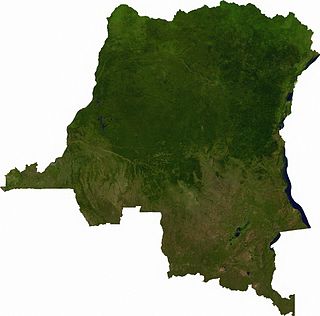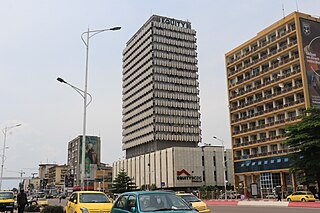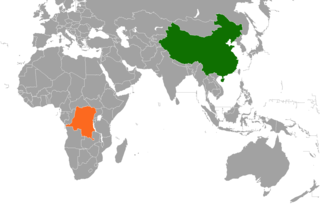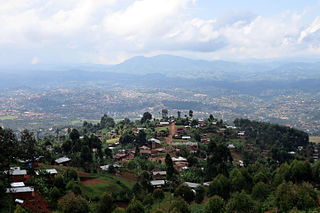Related Research Articles
Discovered in the 1990s, human remains in the Democratic Republic of the Congo have been dated to approximately 90,000 years ago. The first real states, such as the Kongo, the Lunda, the Luba and Kuba, appeared south of the equatorial forest on the savannah from the 14th century onwards.

The Democratic Republic of the Congo (DRC), also known as Congo-Kinshasa and formerly known as Zaire, is a country in Central Africa. By land area, the DRC is the second-largest country in Africa, after Algeria, and the 11th-largest in the world. With a population of around 112 million, the Democratic Republic of the Congo is the most populous officially Francophone country in the world. The national capital and largest city is Kinshasa, which is also the economic center. The country is bordered by the Republic of the Congo, Central African Republic, South Sudan, Uganda, Rwanda, Burundi, Tanzania, Zambia, Angola, the Cabinda exclave of Angola and the South Atlantic Ocean.

North Kivu is a province bordering Lake Kivu in the eastern Democratic Republic of the Congo. Its capital is Goma.

Bukavu is a city in eastern Democratic Republic of the Congo (DRC), lying at the extreme south-western edge of Lake Kivu, west of Cyangugu in Rwanda, and separated from it by the outlet of the Ruzizi River. It is the capital of the South Kivu province and as of 2012 it had an estimated population of 806,940.

Lake Edward is one of the smaller African Great Lakes. It is located in the Albertine Rift, the western branch of the East African Rift, on the border between the Democratic Republic of the Congo (DRC) and Uganda, with its northern shore a few kilometres south of the equator.

Springwood is a town in the Blue Mountains, New South Wales, Australia. Springwood is located 72 kilometres west of the Sydney CBD in the local government area of the City of Blue Mountains. At the 2021 census, Springwood had a population 8,423 people.

The culture of the Democratic Republic of the Congo is extremely varied, reflecting the great diversity and different customs which exist in the country. Congolese culture combines the influence of tradition to the region, but also combines influences from abroad which arrived during the era of colonization and continue to have a strong influence, without destroying the individuality of many tribal customs.

Catholicism has a major presence in the Democratic Republic of the Congo (DRC). It is part of the worldwide Catholic Church under the spiritual leadership of the Pope in Rome.

Articles related to the Democratic Republic of the Congo include:
The Province of the Anglican Church of the Congo is a province of the Anglican Communion, stretching over the Democratic Republic of the Congo and the Republic of the Congo.

Democratic Republic of the Congo–Russia relations are the bilateral foreign relations between the Democratic Republic of the Congo and Russia. The Democratic Republic of the Congo has an embassy in Moscow and an honorary consulate in Yekaterinburg. Russia has an embassy in Kinshasa. The relations between the two countries were established on July 7, 1960, and restored since November 30, 1967.

Health problems have been a long-standing issue limiting development in the Democratic Republic of the Congo.

The Banque du Congo Belge (1909-1960), Banque Belgo-Congolaise also known as Belgolaise (1960-2012), Banque du Congo (1960-1971), Banque Commerciale Zaïroise (1971-1997), and Banque Commerciale Du Congo all refer to a banking group that operated mainly in the Belgian Congo from 1909 to 1960, the Republic of the Congo (Léopoldville) from 1960 to 1964, the Democratic Republic of the Congo from 1964 to 1971, Zaire from 1971 to 1997, and the Democratic Republic of the Congo from 1997 to 2020, going through a number of reorganizations over more than a century. In 2012, Brussels-based Belgolaise was wound down by its then owner Fortis Group, and in 2020, Kinshasa-based BCDC merged with Equity Bank Congo (EBC) to form Equity Banque Commerciale du Congo.

The People's Republic of China (PRC) and the Democratic Republic of the Congo (DRC) have maintained diplomatic relations since 1961 and contacts between the two regions stretch back to 1887 when representatives of the Congo Free State established contacts with the court of the Qing dynasty. The first treaty between the two powers was signed in 1898.

Canada–Democratic Republic of the Congo relations are the bilateral relations between Canada and the Democratic Republic of the Congo. Canada has an embassy in Kinshasa and D.R. Congo has an embassy in Ottawa.
White Congolese are the people from the Democratic Republic of the Congo who are of European descent and are not part of another racial group.
Wendy Alison Toulmin AM is a Christian philanthropist, former Executive Officer of Langham Partnership Australia and missionary in the Democratic Republic of the Congo. In 2009, Wendy Toulmin was made a member of the Order of Australia.

On 7 February 2021, the Congolese health ministry announced that a new case of Ebola near Butembo, North Kivu had been detected the previous day. The case was a 42-year-old woman who had symptoms of Ebola in Biena on 1 February 2021. A few days after, she died in a hospital in Butembo. The WHO said that more than 70 people who had contact with the woman had been tracked.

In late July 2022, anti-MONUSCO protests manifested in the Democratic Republic of the Congo. The protests were against MONUSCO, the United Nations' peacekeeping force in the country, which has been accused by Congolese politicians and civilians of failing to take action to end the decades-old conflict within the country. The protestors demanded that MONUSCO leave the country.
The Democratic Republic of the Congo has a population of about 1.4 million deaf people out of a total population of about 86.7 million. The World Health Organization (WHO) claims that countries in Sub-Saharan Africa are one of the more greatly affected regions by hard-of-hearing complications, compared to the rest of the world. Deaf people in the DRC are subject to neglect and discrimination by their families and the government, but they are also met with small, various ways of support and charity through international, European, Australian, and American religious, non-religious, and governmental organizations.
References
- 1 2 3 "Australia Day 2009 Honours List, member (AM) in the general division of the order of Australia" (PDF). The Australian Honours Secretariat. Retrieved 26 December 2014.
- ↑ Toulmin, Graham (2022). Long Road to Zaïre. Ark House. ISBN 9780645286090.
- ↑ "Dental as Anything". Blue Mountains Gazette. 16 June 2004. Archived from the original on 20 July 2012. Retrieved 26 March 2012.
- ↑ Cleggett, Michael (29 July 2011). "Springwood dentist brings a smile to Africa". Blue Mountains Gazette. Archived from the original on 17 February 2012. Retrieved 26 March 2012.
- ↑ CLEGGETT, MICHAEL (4 April 2012). "Graham gets his teeth into African project". Blue Mountains Gazette. Retrieved 5 April 2012.
- ↑ "Mission to save the world". Blue Mountains Gazette. 25 September 2012. Retrieved 1 December 2013.
- ↑ "Graham and Wendy Toulmin". Church Missionary Society Australia. Archived from the original on 21 June 2018. Retrieved 22 June 2018.
- ↑ "Award Extract Australian Honours Search Facility". Australian Government Department of Prime Minister and Cabinet. Retrieved 2 June 2022.
- ↑ Matheson, Melissa (27 January 2009). "Homegrown Heroes". Penrith Press. Retrieved 26 March 2012.
- ↑ "Band turns brass into gold". Sydney Anglicans. 8 February 2005. Retrieved 14 November 2017.